I hope you read our fun list of awards for the Best Books of 2011. (See PART ONE and PART TWO.) Thanks to those who re-tweeted them or posted links at their facebook pages. We can’t tell you how grateful we are, and glad that our mix of titles and perspectives, celebrated authors and awarded titles seems to resonate with many contemporary religious readers. This was a stellar year for interesting and edifying books and it was fun naming our favorites. (And thanks to the authors and publishers who noted our little kudos. It’s really nice to be noticed.)



But then — horrors! — the other day, while waiting on a customer, out of the corner of my eye, I saw propped right up at a prominent place in our shop a title that is surely one of the most significant books in a number of years. In its particular field–a field I care deeply about–it is vital. I had raved about its significance when it was released months ago. And I didn’t name it in my Best of 2011 lists. I might have gasped out loud and a poor shopper must have thought she did something to offend me. On no, not at all, it’s me. My bad. My Big Sad Omission.
Which got me thinking. And it didn’t take too long until I saw another stray would-be winner displayed finely on a side shelf. Oooo, I loved that book! Coulda shoulda woulda. If only. You see where this is going.
Ladies and gents, a sincere mea culpa for the cruddy offense of failing to name these properly when the two-part Hearts & Minds list was first released. Here’s a “Better Late Than Never Award” for a few more good ones. It makes me look bad, but I hope it makes them look good. For these few more, I simply have to do a Best Books of 2011 PART THREE. Please note that most of these are offered, for the next few days, at 30% off.
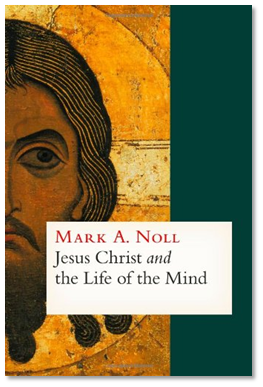 Jesus Christ and the Life of the Mind Mark A. Noll (Eerdmans) $25.00 I raved about this when it first came out, explaining that although it is somewhat of a sequel to the justly famous and very important Scandal of the Evangelical Mind, bringing the conversation about Biblically-informed scholarship in the arts and sciences up to date a bit, it is much, much more. This surveys how our Christology—a high and orthodox regard for the person and work of Jesus Christ–effects our intellectual pursuits. As one of the great scholars of our time, David Lyle Jeffrey of Baylor University puts it, “”By drawing constructively on poets, theologians, philosophers—and especially on the great historic creeds and confessions of faith—he has crafted a challenging, inspiring, christological philosophy of Christian education for the twenty-first century. This is a major contribution.”
Jesus Christ and the Life of the Mind Mark A. Noll (Eerdmans) $25.00 I raved about this when it first came out, explaining that although it is somewhat of a sequel to the justly famous and very important Scandal of the Evangelical Mind, bringing the conversation about Biblically-informed scholarship in the arts and sciences up to date a bit, it is much, much more. This surveys how our Christology—a high and orthodox regard for the person and work of Jesus Christ–effects our intellectual pursuits. As one of the great scholars of our time, David Lyle Jeffrey of Baylor University puts it, “”By drawing constructively on poets, theologians, philosophers—and especially on the great historic creeds and confessions of faith—he has crafted a challenging, inspiring, christological philosophy of Christian education for the twenty-first century. This is a major contribution.”
If you know any scholars, any college professors, teachers, campus ministers who are to encourage Christian thinking, any life-long learners, or renaissance women or men who read widely, this book is very, very important and a great, great read. David Gushee notes that “this may be one of Noll’s most important scholarly contributions.” And that surely makes it one of the very best of the year.
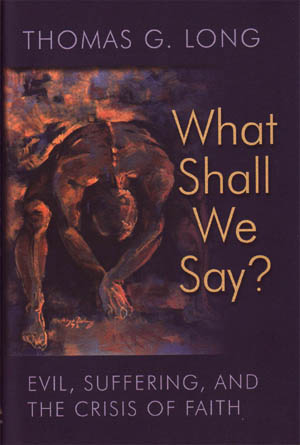 What Shall We Say? Evil, Suffering, and the Crisis of Faith Thomas G. Long (Eerdmans) $25.00 I will be honest. I did not award this a Best Book of the Year award because I wasn’t sure. I hadn’t finished it, was in a terribly busy season (Christmastime in retail land–yikes!) and I needed to ponder this a bit. Books on theodicy are a dime a dozen and good ones are not uncommon. Great ones, though, are rare. I wasn’t sure this was great, although it certainly was good. Certainly one of the best of the year. I’ve thought about it more, studied it a bit. Not sure I agree with it all, but you know what? That doesn’t matter. It has made me think, inspired my own heart, brought joy and sadness and pity and insight to me as a reader. Here is one of the reasons it deserves special commendation: as Rev. John Buchanan writes, “Long pushes beyond the conventional notion of God’s presence in the midst of suffering to a startling concept of God as warrior, going to combat with evil and suffering. This helpful book should be read by every pastor who lives daily with the mystery of theodicy—and by anyone who ever has pondered and asked ‘Why?'” It is in conversation with serious philosophers (Charles Taylor, Alvin Plantinga) and deep theologians (John Douglas Hall, David Bentley Hart) so it isn’t simple sledding or a tender book of nice consolation. Nonetheless, this is a very helpful book and certainly an especially notable book. I should have awarded it sooner.
What Shall We Say? Evil, Suffering, and the Crisis of Faith Thomas G. Long (Eerdmans) $25.00 I will be honest. I did not award this a Best Book of the Year award because I wasn’t sure. I hadn’t finished it, was in a terribly busy season (Christmastime in retail land–yikes!) and I needed to ponder this a bit. Books on theodicy are a dime a dozen and good ones are not uncommon. Great ones, though, are rare. I wasn’t sure this was great, although it certainly was good. Certainly one of the best of the year. I’ve thought about it more, studied it a bit. Not sure I agree with it all, but you know what? That doesn’t matter. It has made me think, inspired my own heart, brought joy and sadness and pity and insight to me as a reader. Here is one of the reasons it deserves special commendation: as Rev. John Buchanan writes, “Long pushes beyond the conventional notion of God’s presence in the midst of suffering to a startling concept of God as warrior, going to combat with evil and suffering. This helpful book should be read by every pastor who lives daily with the mystery of theodicy—and by anyone who ever has pondered and asked ‘Why?'” It is in conversation with serious philosophers (Charles Taylor, Alvin Plantinga) and deep theologians (John Douglas Hall, David Bentley Hart) so it isn’t simple sledding or a tender book of nice consolation. Nonetheless, this is a very helpful book and certainly an especially notable book. I should have awarded it sooner.
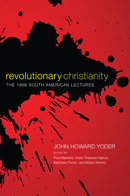 Revolutionary Christianity: The 1966 South American Lectures John Howard Yoder (Cascade) $22.00 Part of my own journey that was formative, at least as I recall it, was sitting in a night class for weeks on end, maybe in 1974, with a Dutch Reformed Kuyperian named Steen studying a Mennonite named John Howard Yoder, whose book, The Politics of Jesus sounded Kuyperian to me, even though I eventually realized that Kuyper was a Calvinist Prime Minister (of Holland) and Yoder a pacifist who most likely wouldn’t have voted for my hero. I didn’t realize the differences were so sharp and, now, years later, I’m less sure of the profundity of their differences. Well, these newly printed lectures by the Christ-centered revolutionary J. H. Yoder were first given in the dramatic years of revolutionary violence (which he opposed) in South and Latin America. One doesn’t have to be a Yoderian to appreciate these vintage pieces, pieces that shaped a generation of peaceful protesting Protestants and socially engaged evangelicals. (The early days of Sojourners, for instance, then called The Post-American, included similar pieces by Yoder and his students.) I simple must award this collection of talks, expertly turned into a very coherent, readable book, since they are a major contribution to Cascade’s important project of issuing all of Yoder’s extant work. People who are to this day heroes of mine—evangelical leaders like Ron Sider and Samuel Escobar–have been influenced by these incisive lectures given during this period of terrible social turmoil. As Michael Cartwright puts it on the back cover, “Readers should marvel at John Howard Yoder’s capacity to speak a fresh word then and now.” Maybe we should award this for best reprint of the year, but it never was formally published and it all seems so fresh and relevant, of more than mere historical interest. The dashing cover gives it extra oomph. Maybe give it an “OWS” award or a book to be read in what Time dubbed “The Year of the Protestor.”
Revolutionary Christianity: The 1966 South American Lectures John Howard Yoder (Cascade) $22.00 Part of my own journey that was formative, at least as I recall it, was sitting in a night class for weeks on end, maybe in 1974, with a Dutch Reformed Kuyperian named Steen studying a Mennonite named John Howard Yoder, whose book, The Politics of Jesus sounded Kuyperian to me, even though I eventually realized that Kuyper was a Calvinist Prime Minister (of Holland) and Yoder a pacifist who most likely wouldn’t have voted for my hero. I didn’t realize the differences were so sharp and, now, years later, I’m less sure of the profundity of their differences. Well, these newly printed lectures by the Christ-centered revolutionary J. H. Yoder were first given in the dramatic years of revolutionary violence (which he opposed) in South and Latin America. One doesn’t have to be a Yoderian to appreciate these vintage pieces, pieces that shaped a generation of peaceful protesting Protestants and socially engaged evangelicals. (The early days of Sojourners, for instance, then called The Post-American, included similar pieces by Yoder and his students.) I simple must award this collection of talks, expertly turned into a very coherent, readable book, since they are a major contribution to Cascade’s important project of issuing all of Yoder’s extant work. People who are to this day heroes of mine—evangelical leaders like Ron Sider and Samuel Escobar–have been influenced by these incisive lectures given during this period of terrible social turmoil. As Michael Cartwright puts it on the back cover, “Readers should marvel at John Howard Yoder’s capacity to speak a fresh word then and now.” Maybe we should award this for best reprint of the year, but it never was formally published and it all seems so fresh and relevant, of more than mere historical interest. The dashing cover gives it extra oomph. Maybe give it an “OWS” award or a book to be read in what Time dubbed “The Year of the Protestor.”
**this one is not available at the special 30% discount. We will offer a complimentary 10% discount on it.
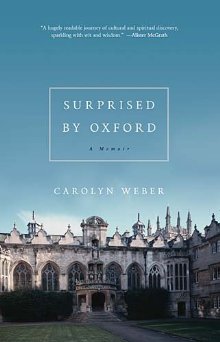 Surprised by Oxford: A Memoir Carolyn Weber (Nelson) $16.99 I have to admit, again, I intended to award this, but felt like I was naming too many memoirs. The one’s I picked were especially enjoyable, often high-octane, full of passion and fury and hints of grace amidst colorfully detailed hurt. This is a book penned by a writer of a different sort; gentle and literary and very smart. The elegant look, the cover art and the french folded flaps, give it a classy feel, and the fine writing deserves such nice touches. The word from the publisher’s promo was that it was akin to the wonderful Girl Meets God. Well, yes, in a way—it is the conversion story of a fascinating young woman, who comes to faith amid the fancy buildings and deep ideas of the world’s most prestigious university. After earning her PhD from Oxford, Weber served as the first female Dean of St. Peter’s College there. She currently is Professor of Romantic Literature at Seattle University and a Visiting Professor at Westmont. (Does this suffice as a hint of the book’s literary merit?) This savvy, beautifully-written book follows the calendar of the academic year, as the author narrates her year, her large questions, her unique journey of faith, and her glorious resolution as she discovers (and explains to us) a very credible, Christ-centered conversion to orthodox, historic faith. There are wonderful memoirs of all sorts and I love stories of people’s lives. Authentic and thoughtful accounts of Christian conversion are harder to come by. This deserves a very honorable mention! I think many will enjoy it, by the way, and some will share it with intellectual types, skeptics or secular professors or free thinkers who need an example of the way God works, even in the academy.
Surprised by Oxford: A Memoir Carolyn Weber (Nelson) $16.99 I have to admit, again, I intended to award this, but felt like I was naming too many memoirs. The one’s I picked were especially enjoyable, often high-octane, full of passion and fury and hints of grace amidst colorfully detailed hurt. This is a book penned by a writer of a different sort; gentle and literary and very smart. The elegant look, the cover art and the french folded flaps, give it a classy feel, and the fine writing deserves such nice touches. The word from the publisher’s promo was that it was akin to the wonderful Girl Meets God. Well, yes, in a way—it is the conversion story of a fascinating young woman, who comes to faith amid the fancy buildings and deep ideas of the world’s most prestigious university. After earning her PhD from Oxford, Weber served as the first female Dean of St. Peter’s College there. She currently is Professor of Romantic Literature at Seattle University and a Visiting Professor at Westmont. (Does this suffice as a hint of the book’s literary merit?) This savvy, beautifully-written book follows the calendar of the academic year, as the author narrates her year, her large questions, her unique journey of faith, and her glorious resolution as she discovers (and explains to us) a very credible, Christ-centered conversion to orthodox, historic faith. There are wonderful memoirs of all sorts and I love stories of people’s lives. Authentic and thoughtful accounts of Christian conversion are harder to come by. This deserves a very honorable mention! I think many will enjoy it, by the way, and some will share it with intellectual types, skeptics or secular professors or free thinkers who need an example of the way God works, even in the academy.
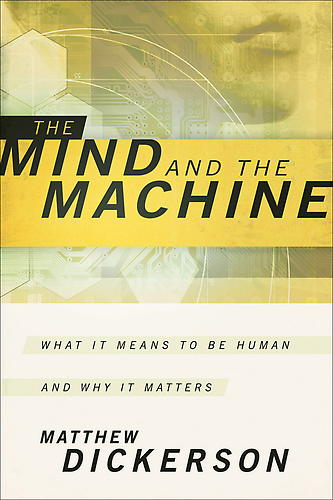 The Mind and the Machine: What It Means to Be Human and Why It Matters Matthew Dickerson (Brazos) $19.99 How could I forget this? Being human, perhaps. Guffaw, chortle and slap your thigh–I know. Yep, I just forgot how much I loved this when it came out early in 2011. It is quite memorable, and, in fact, the notions of memory even play into this remarkable study of neurology, brain chemistry, asking the question if we are more than biochemical machines. Dr. Dickerson (PhD from Cornell) is an interesting bird: he teaches computer science and environmental studies at Middlebury College (where he is also active in campus ministry work, I gather.) He is a great lover of mythic literature has written books on Harry Potter, Tolkien, and a brilliant book called Narnia and the Fields of Arbol about the environmental vision of C. S. Lewis. As with his mentors (people like Peter Kreeft, Tom Howard, and Dick Keyes to whom the book is dedicated) this illustrates his robust and deep thinking (it is a “model of interdisciplinary inquiry” says C. Stephen Evans) and his willingness to tackle a hugely important topic: “what does it mean to be human?” I like Quentin Schultze’s crisp endorsement “I highly recommend this engaging critique of how contemporary popular culture and techno-gurus reduce human beings to machine-like creatures supposedly in the name of progress.” I should have remembered how important and good it is. Whether you like psychology or technology, science or theology, this is a fabulous study. Congratulations, for a book we should all know and remember!
The Mind and the Machine: What It Means to Be Human and Why It Matters Matthew Dickerson (Brazos) $19.99 How could I forget this? Being human, perhaps. Guffaw, chortle and slap your thigh–I know. Yep, I just forgot how much I loved this when it came out early in 2011. It is quite memorable, and, in fact, the notions of memory even play into this remarkable study of neurology, brain chemistry, asking the question if we are more than biochemical machines. Dr. Dickerson (PhD from Cornell) is an interesting bird: he teaches computer science and environmental studies at Middlebury College (where he is also active in campus ministry work, I gather.) He is a great lover of mythic literature has written books on Harry Potter, Tolkien, and a brilliant book called Narnia and the Fields of Arbol about the environmental vision of C. S. Lewis. As with his mentors (people like Peter Kreeft, Tom Howard, and Dick Keyes to whom the book is dedicated) this illustrates his robust and deep thinking (it is a “model of interdisciplinary inquiry” says C. Stephen Evans) and his willingness to tackle a hugely important topic: “what does it mean to be human?” I like Quentin Schultze’s crisp endorsement “I highly recommend this engaging critique of how contemporary popular culture and techno-gurus reduce human beings to machine-like creatures supposedly in the name of progress.” I should have remembered how important and good it is. Whether you like psychology or technology, science or theology, this is a fabulous study. Congratulations, for a book we should all know and remember!
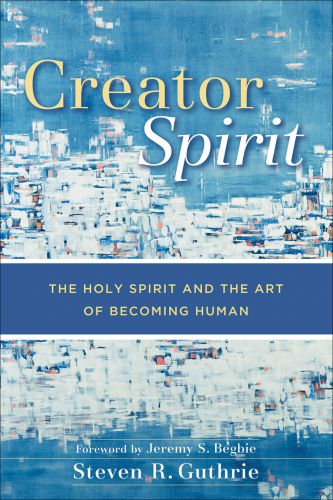 Creator Spirit: The Holy Spirit and the Art of Becoming Human Steven Guthrie (BakerAcademic) $24.99 No excuses, friends: I should have named this but wasn’t confident of my own expertise in this deep field. Theological aesthetics and pneumatology—heavy philosophy and theology in conversation with the arts. A wonderfully glowing forward by the world-class scholar and musician Jeremy Begbie assures us that Gurthrie is a first-rate teacher and “a theologian who can bring clarity out of confusion without ever stifling a sense of openness and wonder.” This is true–the book is not as daunting as it may sound. Pentecostal scholar Amos Young says that the study of the Holy Spirit “takes a quantum leap with this book…and participates in the re-creative work of the Spirit.” Marva Dawn calls it “brilliant” and Pittsburgh Theological Seminary’s Edith Humphrey similarly raves. James K.A. Smith celebrates it with a long endorsement, summarizing that, because of this book “I have a new appreciation for the Spirit’s work and a new excitement about the arts.” The Calvin Center for Christian Worship’s Director John Witvliet says it “stands out as a leading voice in this field.” “One of the best” says William Dyrness. We agree. How can we not add our Hearts & Minds voices to this stellar chorus of affirmations? A hearty, spirited, artful award–congratulations!
Creator Spirit: The Holy Spirit and the Art of Becoming Human Steven Guthrie (BakerAcademic) $24.99 No excuses, friends: I should have named this but wasn’t confident of my own expertise in this deep field. Theological aesthetics and pneumatology—heavy philosophy and theology in conversation with the arts. A wonderfully glowing forward by the world-class scholar and musician Jeremy Begbie assures us that Gurthrie is a first-rate teacher and “a theologian who can bring clarity out of confusion without ever stifling a sense of openness and wonder.” This is true–the book is not as daunting as it may sound. Pentecostal scholar Amos Young says that the study of the Holy Spirit “takes a quantum leap with this book…and participates in the re-creative work of the Spirit.” Marva Dawn calls it “brilliant” and Pittsburgh Theological Seminary’s Edith Humphrey similarly raves. James K.A. Smith celebrates it with a long endorsement, summarizing that, because of this book “I have a new appreciation for the Spirit’s work and a new excitement about the arts.” The Calvin Center for Christian Worship’s Director John Witvliet says it “stands out as a leading voice in this field.” “One of the best” says William Dyrness. We agree. How can we not add our Hearts & Minds voices to this stellar chorus of affirmations? A hearty, spirited, artful award–congratulations!
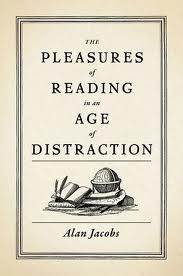 The Pleasures of Reading in an Age of Distraction Alan Jacobs (Oxford University Press) $19.95 I tried to wax a bit eloquent when I reviewed this, explaining why it was so very, very good, so wonderful to read, intellectually stimulating, enjoyable, virtuous. Jacobs is a wonderful, clear writer of elegant prose, and to read him on anything is a joy. (He has three or four collections of random essays, all excellent.) Here he makes a case that one of the great values of reading is pleasure, and it is a fine and vital contribution to the discussions about the role of the book, the demise of the bookstore, e-reading, the shallowing of our attention span, how reading on-line differs from long-form book reading. All of those much-discussed matters in our shifting cultural moment come alive here, but mostly he brings us an astute reminder of the joy of reading. Yep, an Oxford University Press serious book by a brilliant Wheaton College professor, waxing about books, telling you to have some fun with books you enjoy. This was a very important book for me, a work that altered some of my own thinking and the public speaking I do about this topic. I can’t believe I didn’t lead off my 2011 list with this as it is certainly one of of my favorite memories of the year, carefully reading every sentence with wonder and delight and great, great gladness.
The Pleasures of Reading in an Age of Distraction Alan Jacobs (Oxford University Press) $19.95 I tried to wax a bit eloquent when I reviewed this, explaining why it was so very, very good, so wonderful to read, intellectually stimulating, enjoyable, virtuous. Jacobs is a wonderful, clear writer of elegant prose, and to read him on anything is a joy. (He has three or four collections of random essays, all excellent.) Here he makes a case that one of the great values of reading is pleasure, and it is a fine and vital contribution to the discussions about the role of the book, the demise of the bookstore, e-reading, the shallowing of our attention span, how reading on-line differs from long-form book reading. All of those much-discussed matters in our shifting cultural moment come alive here, but mostly he brings us an astute reminder of the joy of reading. Yep, an Oxford University Press serious book by a brilliant Wheaton College professor, waxing about books, telling you to have some fun with books you enjoy. This was a very important book for me, a work that altered some of my own thinking and the public speaking I do about this topic. I can’t believe I didn’t lead off my 2011 list with this as it is certainly one of of my favorite memories of the year, carefully reading every sentence with wonder and delight and great, great gladness.
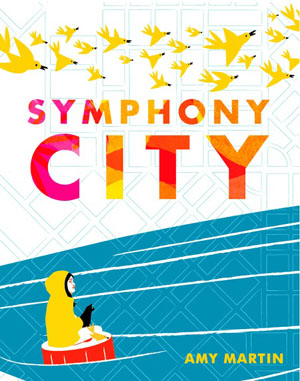 Symphony City/Music Is Everywhere illustrated and written by Amy Martin (McSweeney’s McMullen’s) $17.95 I honestly don’t know where to begin. All of us here are astonished by our discovery of this book, which has sparse text and very contemporary graphic design, showing how music blasts out across a city and the impact it so joyfully makes as a little girl follows the sounds. The publisher, as you may know, is terminally hip. The heavy stock dust jacket unfolds to be a large, two-sided poster, and the hardback book itself is engraved. Very cool. The color is muted yet bold, the silhouettes of random people playing various instruments utterly striking. I don’t know if this is really for children—the fonts and stylized design scream indie rock aesthetic, which is fine, of course, but seems oh so trendy. (Let it be known, to
Symphony City/Music Is Everywhere illustrated and written by Amy Martin (McSweeney’s McMullen’s) $17.95 I honestly don’t know where to begin. All of us here are astonished by our discovery of this book, which has sparse text and very contemporary graphic design, showing how music blasts out across a city and the impact it so joyfully makes as a little girl follows the sounds. The publisher, as you may know, is terminally hip. The heavy stock dust jacket unfolds to be a large, two-sided poster, and the hardback book itself is engraved. Very cool. The color is muted yet bold, the silhouettes of random people playing various instruments utterly striking. I don’t know if this is really for children—the fonts and stylized design scream indie rock aesthetic, which is fine, of course, but seems oh so trendy. (Let it be known, to
o, that the artist has not only done graphic design work for indie, edgy journals, but also for Death Cab for Cutie and Band of Horses.) This is more than delightful and visually exciting and hip, it is a really, truly, wonderful picture book about the goodness of music and the transformation of the urban landscape; without a doubt one of the best of 2011. Caldecott may have missed it, but we did not.
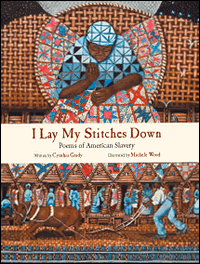 I Lay My Stitches Down: Poems of American Slavery Written by Cynthia Grady, illustrated by Michele Wood (Eerdmans) $17.00 Do you mind if I repeat some of what I wrote last December when this striking, wonderful book arrived?
I Lay My Stitches Down: Poems of American Slavery Written by Cynthia Grady, illustrated by Michele Wood (Eerdmans) $17.00 Do you mind if I repeat some of what I wrote last December when this striking, wonderful book arrived?
Some children’s picture books are so very breathtaking and rich in content that they are doubtlessly a wonderful gift for an adult. This collection of poetry is serious, harsh, and deeply beautiful. The book is done as a series of quilts, and includes poems from around the country. There are informative descriptions in lovely sidebars that explain allusions or lines (for instance if a poem quotes an old black spiritual or if a quilt shows a particular symbol.) We really appreciate great beauty in kid’s books and the quality of this design, the fabulously rich colors, and its storied topic, certainly points toward the ways of redemption. There is no doubt that this is deserving of many awards and we commend the author, artist, and the good eye of the editors at Eerdmans Books for Young Readers who almost always do excellent, high-quality work. They outdid themselves this time. Congratulations! Why not join us in spreading the great news of this book by donating it to your church or public library? It deserves it!
DISCOUNT
any book mentioned
except Revolutionary Christianity
which we have available for 10% off
3O% off
offer good through January 31st.
order here
takes you to the secure Hearts & Minds order form page
just tell us what you want
inquire here
if you have questions or need more information
just ask us what you need to know
.
